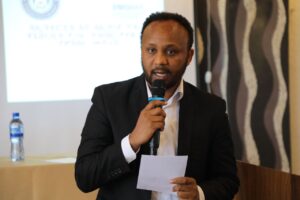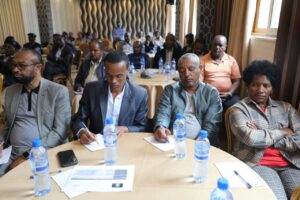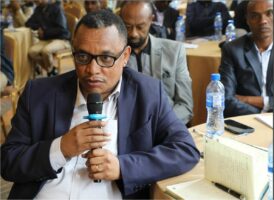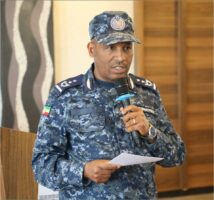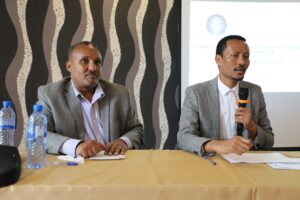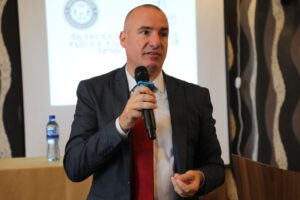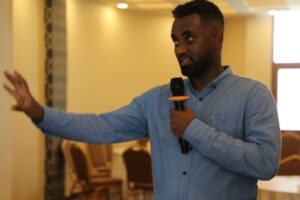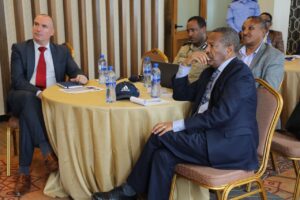Restoring Trust between Police and Communities in Ethiopia - Zenebe’s Story
Before the development of a trust building programme between communities and the police in four Woredas (district-level administrative units) in Addis Ababa, Ethiopia, there were elevated crime rates, particularly in property crimes like vandalism and theft. Simultaneously, violent crimes such as assault and armed robbery remained at a moderate level. Through a partnership between the Ethiopian Police University (EPU) and Interpeace, the implementation of a community security approach, led to improved trust between the police and the community, resulting in notable declines in crime rates and increases in people’s sense of safety.
Zenebe*, a married father of four children and a resident of one of the Woreda witnessed the transformative impact of the trust building dialogues organised by Interpeace. These dialogues provide platforms for community representatives and police officers to discuss local peace, develop problem-solving strategies, and implement capacity-building initiatives. In particular, the scanning, analysis, response, and assessment (SARA) problem-solving approach facilitated joint efforts in identifying and addressing community concerns, supported by the Community GIS Tool (CGIST), which helps to map and analyse data for informed decision-making on safety and crime prevention.
Reflecting on the past, Zenebe recalls the historical marginalisation of community members in police operations, leading to a disconnect between community priorities and police actions, breeding mistrust and suspicion. The trust building programme marked a shift towards collaboration, aiming to involve residents in shaping police services.
"Most of the programme activities were new for all of us. The police in this country did not have the culture to genuinely engage community groups to take an active role in setting priorities and service needs,” Zenebe recalls.
Zenebe recalls how the programme introduced new practices, such as engaging community groups in decision-making processes, fostering inclusivity, and taking proactive measures to enhance community safety. Initiatives like the "shay-bunna" (coffee-tea drinking session) forums, where residents held weekly discussions over a cup of tea or coffee, have strengthened social bonds and facilitated dispute resolution and resource mobilisation.
Following the programme’s implementation, Zenebe and other community members feel empowered to influence security policing in their Woreda., The initiative proves to be an eye-opening experience for both residents and the local police department, instilling a sense of unity and optimism about the future of security. 81% of the community members' responses reflected this positive outcome.
"Because of my participation in the trust-building programme, I am now able to effectively collaborate with the local police in problem identification and resolution. I now believe that the police service at the Woreda level adequately represents my needs and priorities. The local police department is now using inclusive approaches in planning and delivering police services. For example, the police department invited community representatives, including myself, to provide feedback by 2023. This is really impressive, and I've never seen anything like it in my life," says Zenebe.
While celebrating achievement, Zenebe emphasises the importance of sustained engagement from stakeholders to ensure long-term success.
"The local police department's commitment to working closely with community groups to maintain peace at the grassroots level has improved significantly. However, I am convinced that community representatives and police officers require ongoing support to maintain programme outcomes. More specifically, various collaborative problem-solving pieces of training and the CGIST tool are critical to increasing community members and police officers' capacity to deal with community concerns on a long-term basis at the district level."
Zenebe's journey reflects a positive transformation in police-community relations. Sustaining these gains requires collaborative commitment from all stakeholders, aligning with Interpeace’s vision of unity for lasting peace at the grassroots level. As the community looks to the future, expanding the trust-building programme to all regions of Ethiopia remains essential for sustained progress and peacebuilding efforts.
*The name has been changed to ensure security.
Strengthening Ethiopia’s crime response plan
The relationship between the police and the citizens in Addis Ababa has been characterised by mutual mistrust and hostility.
Building on efforts from the ratification of the country’s first ever Police Doctrine in 2021 to improve police-community trust and professionalising the police, Interpeace’s trust-building programme is enhancing the trust between communities and the police by promoting collaborative problem-solving skills. The programme employs the four-stage SARA (scan, analyse, respond, and assess) problem-solving methodology to promote the active and genuine participation of people, community groups, and police officers in detecting, prioritising, and addressing community-level problems. Currently, the programme is in the response phase, in which communities and the police department have formulated a response plan to address the primary causes of crime and disorder in the four woredas (district-level administrative units).
In early November, Interpeace convened a consultative meeting to brief and receive feedback on the response plan from all key stakeholders, including senior commanding officers from Addis Ababa Police Commission (AAPC), Ethiopian Police University (EPU) utility companies, municipality authorities, members of the Inter Africa Group (IAG), NWP, and community representatives. The consultative meeting had three major objectives. First, by engaging all relevant stakeholders, the meeting aimed to promote enabling conditions for the successful execution of the response plans across the four woredas. Second, collecting feedback on the response plan. And finally, the meeting served as a major learning and experience-sharing platform, where EPU and Interpeace communicated findings and progress of the trust-building project to key stakeholders.
The forum was also used to gain invaluable feedback from participants, which will be used to improve the programme.
One of the participants of the meeting, Misrak , a member of the IAG in woreda 10, said.
"I have been living in the Kolfe neighbourhood for many years. I have seen the police service across different governments, and this is the first time I have ever sat at the same table with the Addis Ababa Police Commissioners to talk about peace. This is simply amazing," she said.
She said the local police used to invite them to attend meetings at the community level to discuss community problems. However, in many instances, community members had a limited voice to decide on matters that affected their wellbeing. It was the police who decide everything, including setting the agenda, defining problems, and addressing problems.
The Interpeace trust-building programme, funded by the Government of the Netherlands, has developed crucial activities to help the police employ innovative approaches to community engagement and problem solving. The communities are now sitting down and having a genuine discussion with the police in the course of identifying and prioritizing problems at the neighbourhood level.
Another resident, Henok Tesema, said: "I am now feeling that the police, at least at the Ketena level, can listen to my concerns. Although there are still many problems in the police service in our woreda, I would like to acknowledge the initial progress brought by the programme, and I am hopeful that this will be expanded to other woredas and sub-cities so that the police will be more democratic, inclusive, and responsive to communities."
Largely, the consultative meeting was successful on all three fronts, gaining the commitment of the senior police officers present. The commanding officers, utility companies, and municipality all expressed their commitment to the successful implementation of the response plan.
Why Peacebuilding should be part of the COVID-19 response
COVID-19 has taken the world by surprise and upended life as we know it, introducing looming uncertainties. As we unite in fighting the rapid spread of the virus, we must also recognize that the consequences of the pandemic go beyond medical and public health. The crisis is unique because the direct solutions and ameliorative public health approaches have the potential to be highly conflict-inducing. Thus, the integration of peacebuilding approaches into international responses to COVID-19 is now a matter of urgency.
This briefing paper, Peace and Conflict in a COVID-19 World – Implications for International Responses, summarises ten framing aspects of the crisis and offers three implications for international actors responding to it. Our collective understanding of the causes and solutions to the crisis will determine how we respond to the crisis. While much is uncertain, it is clear COVID-19 is both a multidimensional crisis and an opportunity for change. The key question before us all — especially local and international humanitarian, development, and peacebuilding actors — is how to leverage opportunities for positive change and manage the potential risks?
It is clear human-centred and cooperative approaches which are at the core of peacebuilding work are needed. Peacebuilding approaches of local ownership and leadership with a long-term resilience focus are critical to embed into technical health responses, as well as broader socioeconomic responses to COVID-19. The way in which these approaches are integrated into national and international responses will be critical not only for the technical success of those responses, but also to understand whether they support peace or might exacerbate new or existing grievances already triggered by the pandemic.
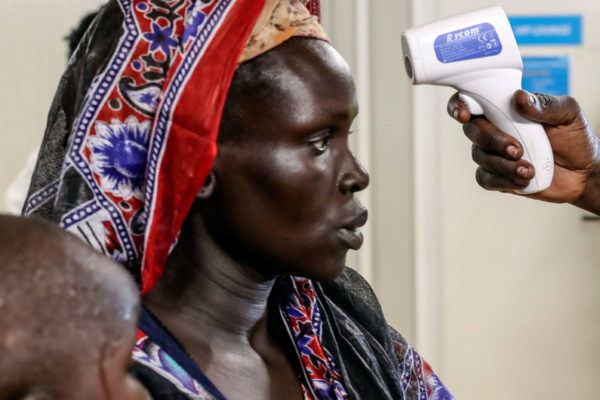
Photo Credit: UN/ Isaac Billy
Early in the crisis some referred to the pandemic as a “great equalizer,” but as the disease evolves, it is increasingly apparent that it is anything but equalizing. COVID-19 threatens broader peace and stability by exacerbating persistent political, social, and economic structural inequalities that render some groups more vulnerable than others. In many contexts, it is reinforcing patterns of inequality and grievances that erode the social contract between individuals and communities with the states that represent, govern, and protect them.
We need resilience approaches that can enhance positive local capacities, skills, and attributes, and enable communities to not just ‘bounce back’ but ‘build back better.’ These conflict sensitive, locally owned, and peace responsive peacebuilding approaches are highly cost-effective and sustainable. They must not be sacrificed due to short-term reallocation of funds to what is deemed as “immediate” pandemic responses. Short- and long-term responses to COVID-19 must be aligned.
Thus, the question of how peacebuilding approaches are integrated into the multidimensional humanitarian and development actions of governments, INGOs and UN actors — or not — is not theoretical. The extent to which international humanitarian and development responses are conflict sensitive and peace responsive to the direct and indirect impacts of COVID-19 will be critical in determining how successfully those interventions contain the virus. The opportunity for transforming conflict dynamics and patterns of structural violence in this moment is significant and can be driven through operational peace responsive approaches.
As a next step to this briefing paper, Interpeace is developing recommendations and practical actions both for its own peacebuilding policy and programming and to inform the policy, programming and coordination of other international peacebuilding actors. They will be published on this website in the coming months.
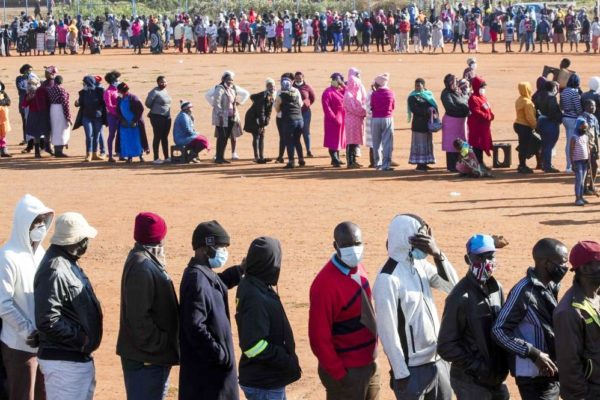
Photo Credit: AP Photo/Themba Hadebe
Read the full briefing paper: here
Interpeace Response to COVID-19
In response to the COVID-19 Pandemic, Interpeace has temporarily closed all offices worldwide, and all staff are working online. We have ceased all international and domestic travel by our staff and consultants, and we are not organizing or participating in large physical gatherings/events.
Interpeace staff have reviewed the full breadth of our peacebuilding work in the field as well as our peacebuilding policy projects. We have now made adaptations to ensure that all scheduled work in our 2020 annual workplan can still be delivered this year. We are in direct contact with our generous donors, partners and the communities we serve worldwide about how those adaptations are occurring. We are also appreciative for the support and commitment to new investment in Interpeace which has been extended to us even since the outbreak of the COVID-19 pandemic.
Planning is underway for the re-opening of our offices in due course, which will be in careful and full alignment with relevant World Health Organisation advice and also with local laws and regulations in the countries where each office is located.
Interpeace meanwhile remains in regular contact and consultation with our supporters and partners as the COVID-19 situation continues to evolve.

Photo credits: Interpeace by Antoine Tardy.
Entrepreneurship and productive capacity-building with at-risk youth in El Salvador
The districts of Nueva Concepción and Ilopango share two particular characteristics. Both towns are located in the midst of breathtaking water landscapes: the Lempa River and the Ilopango Lake. And although they are surrounded by peaceful scenarios, both Nueva Concepción and Ilopango, are located in one of the countries with the highest homicide rates in the world: El Salvador.
In 2015, homicide rates in El Salvador reached a historic high for the post-war period, of 116 murders per 100,000 inhabitants. In this context, Interpeace’s programme is working to strengthen the capacities of people involved and affected by this conflict, in order for them to define the problem, and gain a sense of responsibility and ownership of the solutions that can generate peaceful transformations in their communities. Interpeace firmly believes that this objective can only be reached through the inclusion of all social groups, not only governments and political elites, but also through the participation of civil society.
Interpeace’s programme, entitled “Comprehensive initiatives to prevent violence in El Salvador,” developed with the support of the European Union, is being implemented in ten districts throughout the country. The project seeks to work with at-risk youth between the ages of 18 and 29, with the objective to build capacities for entrepreneurial activities. This programme entails three specific steps: the first is to provide young adults with the necessary tools and methods to peacefully transform conflict. The second step, consists on training these young adults in the field of entrepreneurship. And lastly, the third step involves overseeing the establishment of productive associations and providing seed capital, specifically for materials and equipment to enable the implementation of their entrepreneurial ideas.
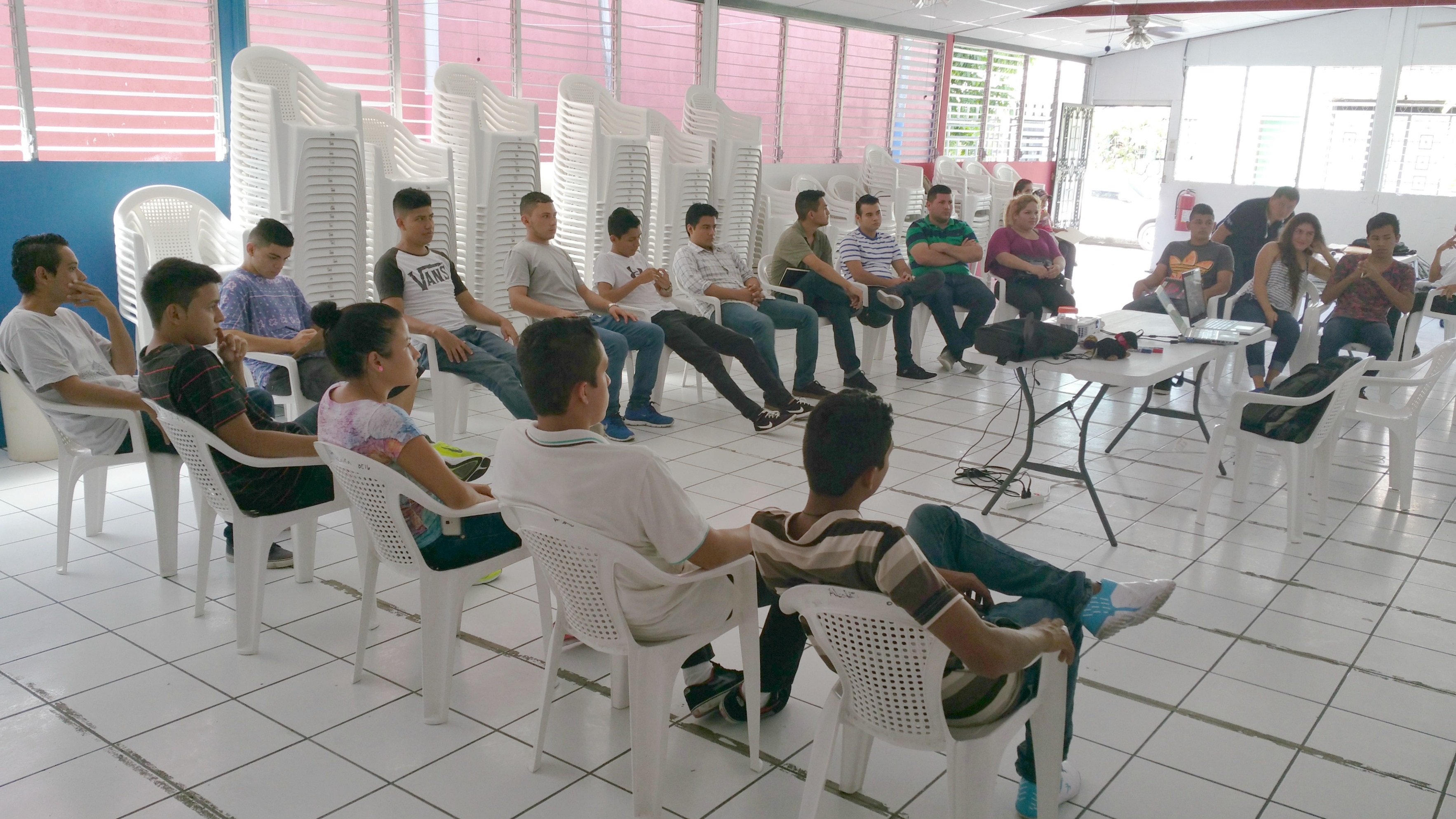
Ilopango, El Salvador. Photo credit: Interpeace
The programme is already underway and throughout July 2016, two workshops were developed focusing on the second step of the project. On July 14, 19 young adults from the district of Ilopango participated in a training session where they identified the enterprises they would like to implement in their community. The next day on July 15, a similar workshop took place in the district of Nueva Concepción. In both towns, the risks and opportunities of each enterprise were discussed and participants engaged in recollecting information to better define the implementation of each project. It’s important to highlight that these participants will ultimately choose the enterprise they want to initiate, as a way to consolidate the local ownership of the process. During August 2016, similar workshops will take place in the other 8 districts established by the programme. At the end of this phase, these young adults will participate in training sessions, aimed at implementing their enterprises.
Offering productive opportunities to youth is a key strategy to preventing violence. Empowering youth through these processes, helps decrease their involvement in threating activities and turns them into agents of positive change within their communities.
On the way to a new championship
Isabel Aguilar Umaña, examines the impact of sport clubs (groups of young people who are fans of a particular sports team) on Honduran society. She first provides a thorough overview of the daily challenges faced by Honduran youth, who feel marginalized in a socio-economic environment with few opportunities. Umaña then shows how Interpeace has played an important role in pushing these sport clubs to foster community building, reduce violence amongst the youth and encourage democratic participation.
